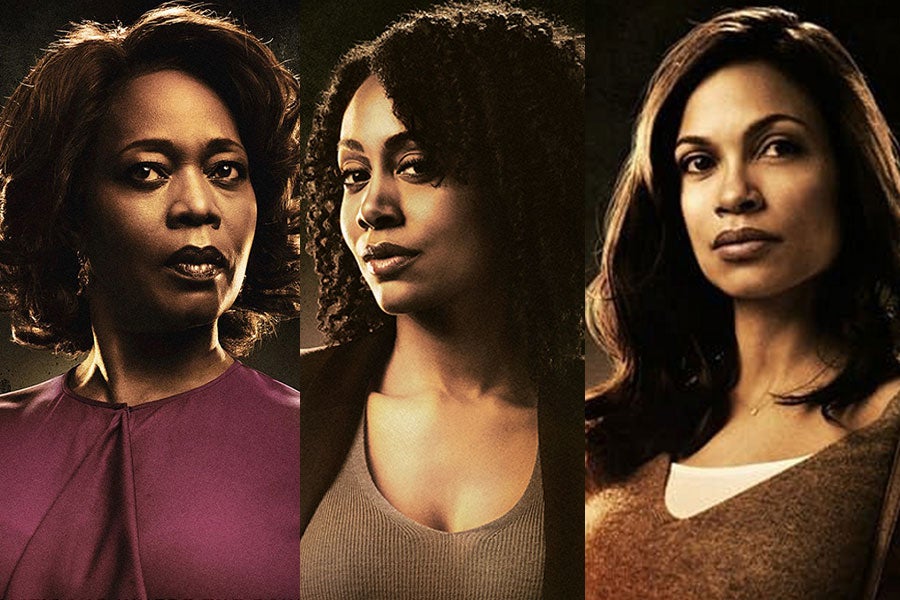
We’ve seen an explosion of nerd culture in the past several years. From popular TV shows like The Walking Dead to a new superhero film released every few months, it’s a good time to be a comic nerd.
And the interest in comics isn’t new for Black fans, who have long championed beloved characters like Black Panther, Blade and Storm.
But too often, Black women are left out of the narrative of hero storytelling. Their characters seem underdeveloped and remain merely on the sidelines. As much as we love the mainstream characters portrayed by Viola Davis, Taraji P. Henson and Kerry Washington, the reality is the supporting Black women characters on those shows are drastically under-developed.
Luke Cage brings Black-supporting characters to the forefront. The latest Marvel comic adaptation hit Netflix September 30 and crashed the popular streaming service shortly after its release.
Starring Mike Colter as the likeable albeit corny and reluctant Luke Cage, who, through a prison experiment gone wrong, is rendered bulletproof. A bulletproof Black man keeping the streets of Harlem safe from corruption and rogue police is as radical as you can get.
Quite simply, Luke Cage is a superhero story for Black folks. Set in present day Harlem, Cage reluctantly becomes a neighborhood hero after he is asked to help a kid who has found himself in a world of trouble. His intervening causes trouble for a local corrupt Congresswoman Mariah Dillard (Alfre Woodard) and her cousin/criminal Cornell ‘Cottonmouth’ Stokes.
But while the show is centered on Luke Cage, it’s the women who carry the series. Alfre Woodard as the corrupt Congresswoman Mariah Dillard, Simone Missick as Detective Misty Knight and Rosario Dawson as Claire Temple are the characters that define the hit show. Cage’s life literally depends on Dawson and Simone’s characters for survival.
As the granddaughter of notorious criminal Mable Stokes, Woodard’s character Dillard was reared in the best education, but her family was part of a criminal enterprise that influenced her shady business tactics. We’ve loved Alfre Woodard for nearly three decades, especially as the matriarch of the Carmichael family in Crooklyn but in Luke Cage, she’s as treacherous as we’ve ever seen her. It’s a role Woodard said her childhood helped influence because she grew up around politics.
Relative newcomer Simone Missick is Misty Knight, the Harlem born detective that can not only take you in a game of 21 but is dedicated to fighting crime in the neighborhood that raised her. The best is yet to come for Missick’s character, as she will soon develop powers of her own.
Subscribe to our daily newsletter for the latest in hair, beauty, style and celebrity news.
Rosario Dawson has brought Claire Temple to several Marvel TV shows and she breathes so much life into Luke Cage. How Dawson managed to stump for Bernie Sanders, dedicate herself to her charity work and film several shows is simply amazing.
Not only is Luke Cage the Blackest show we’ve seen since the premiere of black-ish, but it doesn’t rely on stereotypes about Black people, especially Black women. The characters aren’t unusually strong, angry, and difficult nor do they fall into simple one-dimensional supporting characters. Cage turns the stereotypes on its head by showing a crucial lens into nuanced characters with their own stories, narratives and flaws. To put it bluntly, we needed Misty Knight. We needed Clair Temple. We needed Mariah Dillard.
The show discusses the radical notion of a Black, bulletproof man in the times of Trayvon Martin and police involved shootings. What separates Luke Cage from the other Marvel franchises like Jessica Jones and Daredevil is the connection with Harlem. Woodard’s characters main goal is to keep Harlem Black, no matter what.







While it is set in the present day, Cage’s Harlem in many ways is a reflection of the past. Inhabited by mostly Black folks in a community of rampant crime, unless you were here before Harlem’s massive gentrification, it’s almost hard to imagine living in Cage’s Harlem. But Luke Cage is dedicated to reminding folks that Harlem is very much still Black.
You won’t get any season one spoilers here but it’s safe to say that those pivotal Black women characters will be back for season two. Although we have to wait an entire year to find out the fate of these characters, we can rest assured that they won’t be delegated to extras.
In the meantime, we’ll have the chance to see more of Missick and Dawson’s characters in the upcoming adaptations of Marvel’s Iron Fist and The Defenders.





